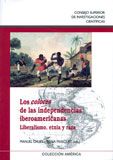


The present volume attempts to explain independence in Ibero-America through spatial, temporal, regional, ethic and racial diversity. In this sense and in their concern, the studies presented here have three connecting premises: the different interpretations and visions of liberalism in the Cádiz 'doceañista'model that emerged in America in the creation of the different nation-states, the interpretation of this liberal revolutionary process by the (not necessarily aliged or hostile) indigenous communities, and, finally, the position taken by the mulatos and black people, not just with regards to the conflict but also to the new society and their social and political resistance, alternatives and stances.
Links:
[1] http://217.160.225.169/node/3263
[2] http://217.160.225.169/node/3262
[3] http://217.160.225.169/node/12929
[4] mailto:j.molina@orgc.csic.es
[5] http://www.csic.es